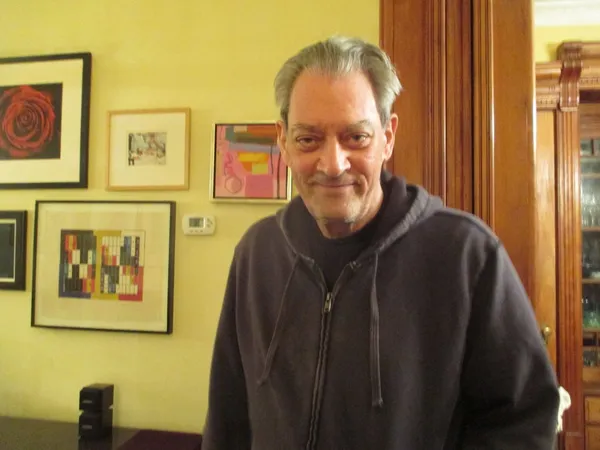 |
| Paul Auster on Smoke, Blue In The Face, and Lulu On The Bridge star Harvey Keitel: "I loved working with Harvey." Photo: Anne-Katrin Titze |
In the first instalment of my conversation with author, screenwriter, and director Paul Auster at his home he discusses the performances of Willem Dafoe, Mira Sorvino, and Harvey Keitel in Lulu On The Bridge, Wings Of Desire, and his friendship with Wim Wenders. We touch on Louise Brooks and Vanessa Redgrave, Frank Wedekind's Earth Spirit and Pandora's Box, Arnaud Desplechin's view of Marion Cotillard’s character in Ismael's Ghosts, Hilma af Klint, and Ernst Lubitsch's Heaven Can Wait.
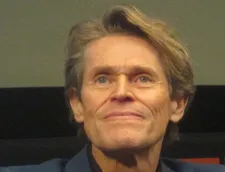 |
| Paul Auster on Willem Dafoe: "Willem is an ambiguous character, Van Horn is. I never thought of him as the devil, though. He's more like St. Peter." Photo: Anne-Katrin Titze |
Lulu on the Bridge, shot by Alik Sakharov (The Sopranos), edited by Tim Squyres, and costumes by Adelle Lutz, stars Harvey Keitel as Izzy Maurer, Mira Sorvino as Celia Burns and Willem Dafoe as Dr. Van Horn with Gina Gershon, Mandy Patinkin, Vanessa Redgrave, Richard Edson, Don Byron, Victor Argo, Kevin Corrigan, Sophie Auster (Paul and Siri Hustvedt's daughter) and scene stealing cameos by Lou Reed and David Byrne.
Paul and I start out with a possibly Transylvanian, at the least uncanny Van Horn, Van Helsing connection.
Anne-Katrin Titze: When I came in you said you were just working. What are you working on?
Paul Auster: I'm working on a new book.
AKT: I have to talk to you about names, because the names in Lulu are fantastic. In Van Horn, there is some Van Helsing, I thought, and then, of course, the horns, the devilishness. Those scenes with Willem [Dafoe] reminded me of Lubitsch's Heaven Can Wait. Do you remember the scenes where he [Don Ameche as Henry van Cleve] is interrogated by this devilish netherworld character [played by Laird Cregar]?
PA: Oh, yeah, yeah.
AKT: We don't even know if he's the devil, but he is talking and charmingly so in that kind of in-between heaven and hell.
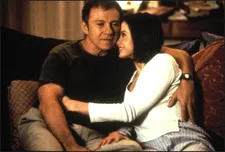 |
| Paul Auster on Mira Sorvino as Celia Burns with Harvey Keitel's Izzy Maurer: "I thought Mira's performance is very good. There's something, as you say, in her face that's open." |
PA: Well, Willem is an ambiguous character, Van Horn is. I never thought of him as the devil, though. [He laughs.] He's more like St. Peter.
AKT: St. Peter or St. Nikolaus. In Germany, he comes on December 6th and he has a big golden book where all your little sins are listed.
PA: Oh, St. Nikolaus. So he's Father Christmas.
AKT: And Van Horn has a file like that [on Izzy], doesn't he? "When you were 14, you did this?"
PA: Yes, "You did this, you did this." I think those scenes between Harvey and Willem are the best in the movie. And I think Harvey's acting is sublime. He's almost whispering at times. I loved working with Harvey. We've worked on three films together [also Smoke and Blue In The Face] all in all, and this is the third. And we really got to know each other very well.
We did very interesting things. Every scene, I said to Harvey, "I want to do at least three takes, and I want you to do it differently each time. I want the extroverted version, outgoing and somewhat loud. I want a quieter, and then a very quiet.
And we used bits of all the takes because he was good in all of them. It really helped me in the editing room to get the emotional resonances I wanted. He was so amenable. He was so eager to do this.
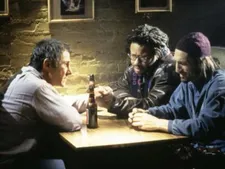 |
| Izzy Maurer (Harvey Keitel) with musicians Tyrone Lord (Don Byron) and Dave Reilly (Richard Edson) |
We had a great time. And when it was all over, when his part ended, you know, he actually started crying. There's a photo of me with my arm around him. We're walking away and his head is down. So every time I look at that photo I think of that day. Harvey leaving the set.
AKT: It's almost as if you're Celia [Mira Sorvino]. He doesn't want to leave her alone, either.
PA: Also, the original film was much longer and I cut out a big chunk of it. And I realize now, again looking at it, I'm glad I did. But some of the most beautiful filmmaking we did are in the scenes that were cut.
AKT: Lulu scenes, right?
PA: Yes, the Lulu scenes. There were four. I took the Wedekind play, the two plays [Earth Spirit and Pandora's Box]. There are nine scenes, I think, altogether, and I did adaptations of four of them. You read this [in Three Films by Paul Auster], I modernized everything,
I made it into a contemporary Lulu, who becomes a rock 'n' roll singer, not a dancer. Visually, it was great, but it did drag, even though the performances are very good. And then I decided - it was very hard to do this - to cut it out. And there were some wonderful actors who did great work.
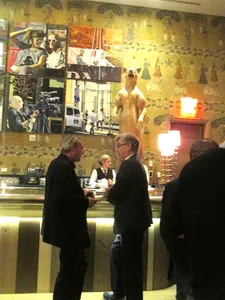 |
| Paul Auster with Wim Wenders at the Whitby reception for Pope Francis: A Man Of His Word Photo: Anne-Katrin Titze |
AKT: There's Jack the Ripper, isn't there?
PA: Yes, played by an actor named David Thornton. I'll tell you, if you ever get hold of the DVD, those scenes are in the DVD.
AKT: As an extra?
PA: Yes, as an extra. They were never colour-timed or finished but they were edited. The sound editing was never done, so they look rough. But still you get a sense of what we were doing. The painter Schwarz [from the Wedekind play] has turned into a photographer named Black. And, you know, Lulu in the original play is dressed up in a Pierrot costume when the painter is painting her.
What I did with Mira, and it was really very effective, I gave her a Charlie Chaplin suit. And she has a little moustache. Twitching [Paul twitches]. It was good, but finally the film suffered. I made it too complicated. And so by cutting out that material, which is probably about 25 minutes, it became much more focused, I think.
AKT: I read the screenplay, with these scenes in it. I wondered a few times if I had seen them or just imagined them myself.
PA: You see that whole book, everything, the script, was prepared for publication before the final edit.
AKT: Originally I had hoped to talk with you and Wim [Wenders] together. Because my big plan is that you finally do something together. And I could poke at the two of you.
PA: I don't know if he's told you about this, I think we've had four or five projects.
AKT: I know of some.
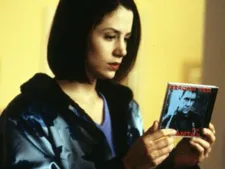 |
| Paul Auster on Mira Sorvino struggling to unwrap the Izzy Maurer CD: "I was so proud of having thought of that and how well Mira did it." |
PA: Each one has not worked for one reason or another. But you know what? It's fine. We've stayed very good friends. Maybe we would have started fighting if we had worked together. I doubt it, but maybe. Did you go to Wings Of Desire?
AKT: No, I couldn't go that night. I had other plans.
PA: It was beautiful. The restoration is sublime. Anyway, Wim talked in a Q&A after [at Film Forum].
AKT: With Michael [Almereyda].
PA: With Michael, exactly. So Wim said certain things when we had dinner the next night. And I said "Wim, the things you were saying about scripts and not having it all mapped out." I said "If you had just told me that! That that's how you preferred to work! I would have adjusted very easily. I would have given you all kinds of notes to use or not use as you saw fit and then just run with it."
Anyway, the reason why things didn't work was not us so much as financial things. Money fell through. And then with Lulu, he backed out. I mean, I wrote it for him, you know that.
AKT: And Juliette Binoche. Yes.
PA: Yeah. And then they both left. After a while I felt - you know those spaceships that go up? And then they lose one part? And then they lose another part?
AKT: That's very funny. That's a great image.
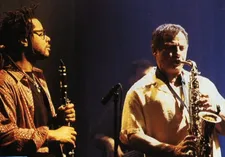 |
| Harvey Keitel performing as jazz legend Izzy Maurer with Don Byron as Tyrone Lord in Lulu on the Bridge |
PA: And then you just have a little capsule? I was the guy in the capsule going on.
AKT: That's a great image. I love that. There was a moment in Lulu when I was reminded of something Arnaud Desplechin said about one of his characters in Ismael's Ghosts. He told me about Carlotta Bloom, played by Marion Cotillard, that "She is always on the side of life." Celia is always on the side of life, isn't she? I don't really know what it means.
PA: Again, I haven't looked at the film in so long and I thought Mira's performance is very good. There's something, as you say, in her face that's open.
AKT: And vulnerable and alive.
PA: Yes.
AKT: Also, there are smiles that seem to wander from one person to another in the scenes with Vanessa Redgrave and your daughter [Sophie]. All the women have a strange bond through the openness in their faces.
PA: Yeah, well, it's a strange film. I mean, it's a form that I didn't invent. Other people have done it. The dying thoughts of a man. The thoughts of a dying man, I should say. It does give it all a dreamlike quality, I hope. I don't know if people can get it, but the elements of what goes into Izzy's fantasy, they're all there in the very beginning. You have all the pictures of the women in the men's room.
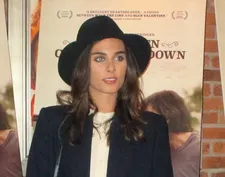 |
| Paul Auster's The Inner Life Of Martin Frost and Lulu On The Bridge performer Sophie Auster Photo: Anne-Katrin Titze |
AKT: Even Louise Brooks [Pabst's Lulu].
PA: Even Louise Brooks and Vanessa Redgrave and Mira. And even Siri is there, to the side. And then in a way the piece of plaster that comes down, turns into the stone you see in his imagination. There are all kinds of little things I put in there, that are the kinds of things that novelists would do. And I don't think you can get them in a film.
For example, I put a little graffito in a window - which is something I saw on a T-shirt. I thought it was very funny. It's called "Beware of God." Which is dog spelled backwards. And there are always signs "Beware of the dog." Well, this sign was "Beware of God."
And then when Harvey is walking down the alley and he's about to discover the dead man, a dog barks. And he turns around to look. And I thought, well, it is the heavens are calling. They're telling him something's about to happen. It's too subtle.
AKT: Yeah. I did not catch that. I think I caught quite a few things about the unwrapping of objects.
PA: Three times!
AKT: Three times, right.
PA: Three packages that are really hard to open.
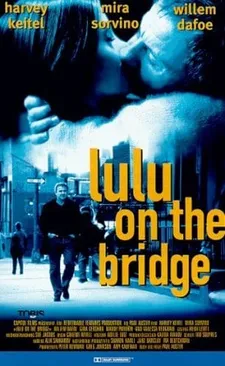 |
| Lulu On The Bridge poster |
AKT: Big laugh at Metrograph for the first one.
PA: The CD?
AKT: The CD is so perfect because everybody can relate.
PA: I was so proud of having thought of that and how well Mira did it. I remember the first couple of takes weren't so good. I said:"No, no, Mira, wait! Slow down and use your teeth. This is going to make it better.
AKT: Because everybody who lived through the time of CDs knows that frustration.
PA: Yes, I know, but I've never seen it in a movie.
AKT: Neither have I. It's all yours.
PA: And then you have Harvey opening the box with the knife when he took out the stone. And then finally, the crackers in the cell where he's being held.
AKT: So it's three of Pandora's boxes in there.
PA: Exactly.
AKT: Have you seen the Hilma af Klint exhibit at the Guggenheim yet?
PA: No.
AKT: It's a beautiful exhibition. She was the unsung pioneer of abstract art, before Kandinsky, before Mondrian. She was also into spiritualism and said that one day her paintings would be shown in a temple with spiral stairs. And now, almost a century later, there she is.
PA: In the spiral stairs. Frank Lloyd Wright's temple.
AKT: Absolutely. Sometimes objects or works of art are meant for a different time.
On Monday, December 3, Sophie Auster will perform songs at Coney Island Baby, 169, Avenue A in Manhattan.





















